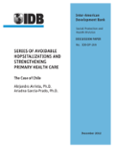Series of Avoidable Hospitalizations and Strengthening Primary Health Care: The Case of Chile
Date
Dec 2012
This paper studies the effect of ambulatory and hospital coinsurance rates on HACSC among individuals with private insurance in Chile. During the last decade, Chile's private health sector has experienced a dramatic increase in its hospitalization rates, growing at four times the rate of ambulatory visits (see graph 1). Such evolution has raised concern among policy makers, interested in promoting more preventive services, and a major use of ambulatory care. The growth on the prevalence of chronic diseases has also set up the alarm. A burden disease study made in 2007 shows that 84% of the total diseases in the country were non-communicable diseases (Universidad Católica de Chile, 2008). The 2003 National Health Survey showed that only a small fraction of those affected by a chronic disease had their condition under control (Bitrán et al, 2010). In this context, coinsurance can be a valuable tool for dealing with cost escalating problems in the health system while, at the same time, promoting more ambulatory visits and preventive services and less HCSC.



